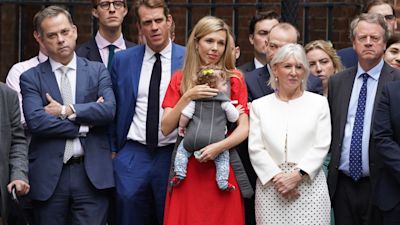What a change of Prime Minister could mean for Cumbria & the South of Scotland

This was meant to be the week when we finally got a decision from the government on whether the hugely controversial West Cumbria coal mine would go ahead.
Instead, we saw the dramatic downfall of a Prime Minister.
Among dozens of resignations, Dumfriesshire Conservative MP David Mundell quit as the UK Trade Envoy to New Zealand on Wednesday evening, telling me "a series of dramas... has to be brought to a head."
According to reports, his constituency neighbour, Dumfries & Galloway MP Alister Jack, was among the 'uberloyalists' urging Boris Johnson to keep going that evening.
He then stood in Downing Street to watch the PM announce his imminent departure on Thursday lunchtime.
Mr Jack remains in his position as Scottish Secretary for now, while Copeland MP Trudy Harrison - who also remained loyal - has been promoted slightly within the Department for Transport as part of the caretaker government.
Mr Johnson was originally due to be in West Cumbria on Thursday.
Ms Harrison told me he was going to speak to people in the nuclear industry and discuss bids for local investment.
Surely, though, the coal mine had something to do with the planned visit, and it's logical to think he was expecting to mark it being given approval by a certain cabinet colleague.
Thursday 7 July was the deadline the government had set themselves to make a decision.
On Wednesday morning, we learned that the deadline was not going to be met, with the Department for Levelling Up, Housing & Communities telling me it was never legally binding.
According to reports, Communities Secretary Michael Gove had been to see the Prime Minister that morning, and advised him to step down.
On Wednesday night, Mr Johnson sacked Mr Gove (another stunning twist in the two men's rollercoaster political relationship).
On Thursday morning, Greg Clark was appointed as interim Communities Secretary, taking on the mine decision.
Mike Starkie, elected mayor of Copeland and a supporter of the project, immediately wrote to Mr Clark (though mistakenly spelling his name 'Clarke') urging approval as soon as possible.
Interested parties have been told a decision on the mine will now be taken by 17 August.
If we're looking for clues on which way he might turn, Mr Clark has previously been a cabinet minister responsible for tackling climate change.
But, on the other hand, the Prime Minister, Business Secretary Kwasi Kwarteng and Environment Secretary George Eustice, who have all made supportive remarks about the mine recently, are all still in their cabinet positions.
After announcing he would stay on while his successor is chosen, the Prime Minister pledged not to make big changes of direction on policy during that time.
I think that makes it more likely that Greg Clark will have to go with the recommendation made by the planning inspector (who oversaw last autumn's public inquiry) on whether to give the mine the go-ahead.
We don't know what that recommendation is yet, but are expecting it will be made public when the government's decision is made - and it would be hugely controversial if effectively a stand-in minister went his own way.
In the longer term, a change of Prime Minister is of course likely to have big consequences for our region.
There could be a question mark over the government's ambition to create a directly elected mayor for the whole of Cumbria, with significant devolved powers.
We'll have to see if the next man or woman in No10 puts the same emphasis on 'levelling up' prosperity around the country, which has seen pots of funding distributed to a number of projects in Cumbria and the South of Scotland.
As for the big question of Scottish independence, the next Conservative leader is no more likely to agree to a referendum - though unionists may be breathing a sigh of relief, due to Mr Johnson's unpopularity north of the border.
Scottish Borders MP John Lamont is supporting Penny Mordaunt in the leadership contest, saying she is "very strong on the union."
On Friday, David Mundell said he would back Ben Wallace, before the Defence Secretary confirmed on Saturday he would not be running.
Things will keep changing pretty fast, with other local Tory MPs declaring for other contenders.
Whoever comes out on top, they will face a tough challenge to hold on to places like Workington, famously part of the 'Red Wall' of old Labour territories charmed by Boris Johnson in 2019.
Amid all that that has been said and written about the Prime Minister's strengths and weaknesses over the last few days, check out some archive we found from 2006.
Asked by ITV Border about a very unflattering newspaper column he'd written about Carlisle the previous year, he laughed: "there is a thing you can do now - you can apologise for the offence you have caused."
It feels rather prescient now - for a man who often seemed to be playing at politics, and was ultimately brought down by a series of scandals which he continued to insist were not really his fault.
Listen to our latest podcasts to find out What You Need To Know: